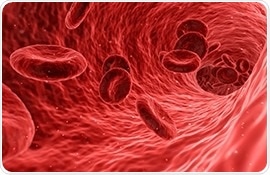A specific regulatory protein significantly influences the development of tumor-inducing blood vessels in the bone marrow of blood cancer patients. Using a series of different experiments, the team identified that a transcription factor known as JunB is central for the formation of new blood vessels in the bone marrow of patients suffering from multiple myeloma (MM). The findings, which have been published in the journal Leukemia, could pave the way for novel treatment approaches for this still incurable disease.

Image Credit: A.Socha / Pixabay.com
MM is the second most common form of cancer in hematopoietic cells. Despite significant therapeutic advances over the past two decades, MM remains incurable. A critical factor in MM pathogenesis is the formation of new blood vessels in the bone marrow (known as angiogenesis). Exact molecular mechanisms leading to this process are still unknown. By identifying a new key regulator of tumor bone marrow angiogenesis, an international team headed by KL Krems’ Dr Klaus Podar (Department of Internal Medicine II at Krems University Hospital) has now shed more light on this complex mechanism.
Disease promotion
Specifically, the team examined the role of a transcription factor, a protein called JunB, which regulates the production of other proteins. Results demonstrated that JunB regulates the production of so-called angiogenic factors, and thereby contributes to bone marrow angiogenesis, in early MM in particular.
For Dr. Podar and his team, JunB is by no means an unknown player in MM. Indeed, they have analyzed the complex functions of this protein in MM pathogenesis for many years. “Our past studies have already demonstrated that JunB promotes tumor cell proliferation, survival and drug resistance,” says Dr. Podar, summing up the findings of his group’s earlier findings.
The fact that we have now also identified a key role for JunB in the formation of blood vessels within the bone marrow underscores the potential value of therapeutically targeting this protein.”
Dr Klaus Podar, Department of Internal Medicine II, Krems University Hospital
Wide range of supporting experiments
Utilizing a wide range of up-to-date methodologies and genetically inducible tumor-cell models, results demonstrated that JunB correlated with the induction of angiogenic factors, VEGF, VEGFB and IGF1, in particular. Consequently, culture media stimulated blood vessel growth upon JunB activation. A key role for JunB in MM bone marrow angiogenesis was further confirmed in an innovative dynamic 3D-model, in an in vivo model, as well as in patient bone marrow sections. Importantly, the researchers’ results also demonstrated that JunB function was independent of low oxygen levels in the tumor microenvironment – usually a crucial factor for the production of pro-angiogenic factors. As Dr. Podar points out: “This makes JunB a promising therapeutic target. Its inhibition may even prevent the initiation of symptomatic MM.”
In summary, the research team which consists of members from Austria, Belgium, China, Germany, Italy and the US uncovered a new function of the regulator protein JunB in early MM pathogenesis. Together with their previous findings these data strongly support the value of targeting JunB for MM therapy. Molecular research at KL Krems has once again proven that it is geared towards obtaining insights for direct clinical benefit.
Source:
Journal reference:
Fan, F., et al. (2021) JunB is a key regulator of multiple myeloma bone marrow angiogenesis. Leukemia. doi.org/10.1038/s41375-021-01271-9.